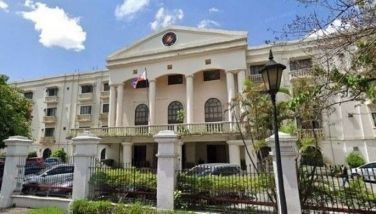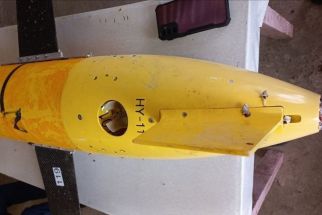PEA to SC: Review Amari deal decision
June 2, 2003 | 12:00am
The Public Estates Authority has asked the Supreme Court to reverse its final ruling nullifying the joint venture agreement between the PEA and Amari Coastal Bay Development Corp. to develop 153 hectares of land reclaimed from Manila Bay.
In a 27-page appeal, the PEA said the court’s May 6 ruling would have "far-reaching effects on the Philippine economy" and drive away investors.
Voting 8-5 with one abstention, the high tribunal had rejected Amari’s appeal and affirmed its July 9, 2002, decision nullifying the PEA-Amari deal — once derided by former Senate President Ernesto Maceda as the "mother of all scams" — after the court found the deal unconstitutional.
The 2002 ruling stemmed from a December 1998 petition by former solicitor general Francisco Chavez seeking to nullify PEA’s sale to Amari of 77.34 hectares of still submerged areas of Manila Bay.
The court ruled that the submerged areas "remain inalienable natural resources of the public domain" and their sale to Amari violated the constitutional injunction on selling the country’s natural resources, like public land, to foreigners. Amari is an Italian-Thai consortium.
Article 12 of the Constitution limits ownership of the country’s natural resources exclusively to Filipinos.
Final decisions of the Supreme Court can no longer be appealed. In its petition, Amari asked the court to examine its second appeal, saying the tribunal had made exceptions in the past for the sake of public interest.
"Since the creation in 1977, the PEA entered into various reclamation projects and compensated its private sector partners in the form of reclaimed land," the PEA said in its petition.
However, "all the on-going reclamation and development works had stopped" when the court’s July 2002 ruling "cast doubts on the validity of the transfer of certificate of titles issued by PEA as payment to its contractor-developers-investors or joint venture partners in reclamation."
Because of the ruling, the PEA has to figure out how to raise money to compensate its joint venture development partners, complete the development of reclaimed lands as well as projects that were halted.
If the ruling were to be applied to all other reclamation projects undertaken up to the Ferdinand Marcos administration, the PEA estimated it would cost the government up to P200 billion to compensate developers and investors, who were likewise paid with reclaimed land.
The government stands to lose P1.8 billion in real estate taxes yearly if the lands were taken back, the PEA argued.
Government agencies and local governments that paid private contractors, investors and developers with reclaimed land would also be adversely affected by the ruling, the PEA added.
In the case of Amari, the PEA argued that the reclaimed Manila Bay land, known as Freedom Islands, were not public land because they were reclaimed by and acquired from a state-run company, Construction and Development Corporation of the Philippines (now Philippine National Construction Corp.) in 1981.
Since the lands were not reclaimed by the government, they should not be considered "inalienable lands of public domain" under the law governing public lands and, therefore, could be sold to Filipino citizens or qualified private companies, including Amari, the PEA said.
"While there is nothing in the provisions of the Public Land Act which classified or characterized the reclaimed lands undertaken by private persons/entities, the Honorable Court, however, classified all reclamation areas as lands of public domain in one telling swoop, in effect, placing all reclamation endeavors under the coverage of the Public Land Act within the ambit of the constitutional prohibition against disposition thereof to private corporations/entities, except through lease," the PEA said.
The court may have misinterpreted the provisions of Executive Order 525, which stated that the PEA "hold the reclaimed public lands, not as an end-user entity, but as the government agency primary responsible for integrating, directing and coordinating all reclamation projects for and on behalf of the national government."
Under EO 525, the PEA may supervise lands reclaimed by other government agencies or local governments, and may develop reclaimed land such as the 153 hectares reclaimed from Manila Bay.
In 1995, the PEA entered into a joint venture deal with Amari, which would develop and eventually own the reclaimed land.
But in November that year, Maceda delivered a privileged speech describing the deal as the "mother of all scams" that shortchanged the government by about P50 billion.
In 1997, then President Fidel Ramos ordered a review of the contract after two Senate committees concluded that the deal was illegal and that the reclaimed lands cannot be transferred to Amari because these lands were public domain.
The following year, Ramos’s successor, Joseph Estrada, ordered the deal renegotiated.
In a 27-page appeal, the PEA said the court’s May 6 ruling would have "far-reaching effects on the Philippine economy" and drive away investors.
Voting 8-5 with one abstention, the high tribunal had rejected Amari’s appeal and affirmed its July 9, 2002, decision nullifying the PEA-Amari deal — once derided by former Senate President Ernesto Maceda as the "mother of all scams" — after the court found the deal unconstitutional.
The 2002 ruling stemmed from a December 1998 petition by former solicitor general Francisco Chavez seeking to nullify PEA’s sale to Amari of 77.34 hectares of still submerged areas of Manila Bay.
The court ruled that the submerged areas "remain inalienable natural resources of the public domain" and their sale to Amari violated the constitutional injunction on selling the country’s natural resources, like public land, to foreigners. Amari is an Italian-Thai consortium.
Article 12 of the Constitution limits ownership of the country’s natural resources exclusively to Filipinos.
Final decisions of the Supreme Court can no longer be appealed. In its petition, Amari asked the court to examine its second appeal, saying the tribunal had made exceptions in the past for the sake of public interest.
"Since the creation in 1977, the PEA entered into various reclamation projects and compensated its private sector partners in the form of reclaimed land," the PEA said in its petition.
However, "all the on-going reclamation and development works had stopped" when the court’s July 2002 ruling "cast doubts on the validity of the transfer of certificate of titles issued by PEA as payment to its contractor-developers-investors or joint venture partners in reclamation."
Because of the ruling, the PEA has to figure out how to raise money to compensate its joint venture development partners, complete the development of reclaimed lands as well as projects that were halted.
If the ruling were to be applied to all other reclamation projects undertaken up to the Ferdinand Marcos administration, the PEA estimated it would cost the government up to P200 billion to compensate developers and investors, who were likewise paid with reclaimed land.
The government stands to lose P1.8 billion in real estate taxes yearly if the lands were taken back, the PEA argued.
Government agencies and local governments that paid private contractors, investors and developers with reclaimed land would also be adversely affected by the ruling, the PEA added.
In the case of Amari, the PEA argued that the reclaimed Manila Bay land, known as Freedom Islands, were not public land because they were reclaimed by and acquired from a state-run company, Construction and Development Corporation of the Philippines (now Philippine National Construction Corp.) in 1981.
Since the lands were not reclaimed by the government, they should not be considered "inalienable lands of public domain" under the law governing public lands and, therefore, could be sold to Filipino citizens or qualified private companies, including Amari, the PEA said.
"While there is nothing in the provisions of the Public Land Act which classified or characterized the reclaimed lands undertaken by private persons/entities, the Honorable Court, however, classified all reclamation areas as lands of public domain in one telling swoop, in effect, placing all reclamation endeavors under the coverage of the Public Land Act within the ambit of the constitutional prohibition against disposition thereof to private corporations/entities, except through lease," the PEA said.
The court may have misinterpreted the provisions of Executive Order 525, which stated that the PEA "hold the reclaimed public lands, not as an end-user entity, but as the government agency primary responsible for integrating, directing and coordinating all reclamation projects for and on behalf of the national government."
Under EO 525, the PEA may supervise lands reclaimed by other government agencies or local governments, and may develop reclaimed land such as the 153 hectares reclaimed from Manila Bay.
In 1995, the PEA entered into a joint venture deal with Amari, which would develop and eventually own the reclaimed land.
But in November that year, Maceda delivered a privileged speech describing the deal as the "mother of all scams" that shortchanged the government by about P50 billion.
In 1997, then President Fidel Ramos ordered a review of the contract after two Senate committees concluded that the deal was illegal and that the reclaimed lands cannot be transferred to Amari because these lands were public domain.
The following year, Ramos’s successor, Joseph Estrada, ordered the deal renegotiated.
BrandSpace Articles
<
>
- Latest
- Trending
Trending
Latest
Trending
Latest
Recommended































